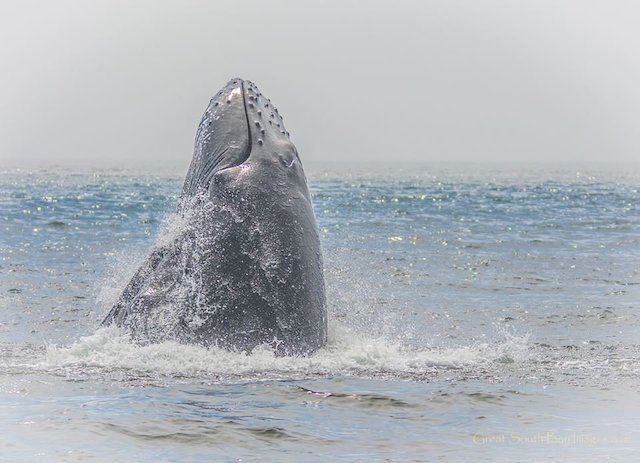Video: Whale Spotted In Waters Off Rockaway Beach
June 3, 2019, 1:22 p.m.
Wave to the Rockawhale!

A whale <a href="http://gothamist.com/2014/09/17/whale_nyc_photos.php#photo-1">spotted off Rockaway Beach in 2014</a>.
Those of you who were smart enough to ignore uncertain weather conditions and hit Rockaway Beach this weekend may have been rewarded with a rare whale sighting. On Sunday around 9:15 a.m., Twitter user Justin Hendrix spotted a leviathan of uncertain species cruising by the shore around Beach 97th Street. He tweeted a video of its giant flipper, popping up to wave hello.
"I was just as excited as my kids, who are 6 and 8. I've lived in New York nearly 20 years, and I've never seen a whale," Hendrix told Gothamist. "It was swimming down the shore slapping the water with its fins." Hendrix speculated that the Rockawhale may have been pec slapping, a maneuver whales use to communicate and/or flirt.
A whale scooting by to wink cheekily at you from the waves? Let's lean in for a closer look.
Whale sighting at #RockawayBeach pic.twitter.com/gz9yvECrXF
— Justin Hendrix (@justinhendrix) June 2, 2019
Astounding, certainly, but maybe also alarming for those of you who remember the beached humpback found dead at Rockaway in 2017. Thankfully, Sunday's sea titan did not strand itself, and according to Paul Sieswerda—former curator at the New York Aquarium and founder of the citizen science group Gotham Whale—humpbacks, reportedly the most common species in New York waters right now, may swim close to shore for feeding purposes.
"They come up for what the local fishermen call prey balls," Sieswerda explains. Our whale neighbors have a particular fondness for menhaden, or bunker, fish: Predators chase these into dense clouds, "perfect gulping size for humpback whales," Sieswerda said, particularly in shallow waters where the quarry have fewer escape options. Then the humpbacks come "lunging through the bait ball with their mouth[s] wide open," he continued, snapping up all the snacks in one go.
Whale at Rockaway Beach NYC! https://t.co/nhAEorAjKS
— Justin Hendrix (@justinhendrix) June 2, 2019
That menhaden have returned to New York's waters with such force probably explains why whale numbers have jumped up dramatically in recent years: Gotham Whale counted 272 whale sightings in 2018, a staggering improvement on 2011's five sightings. Sieswerda attributes the increase to government efforts to protect endangered whale populations, and also to clean up the Hudson River.
Reached by phone this morning, Riverkeeper boat captain John Lipscomb told Gothamist that although local "water quality has improved dramatically since the 1950s, before the Clean Water Act" of 1972, that "enormous" progress has flattened out in recent years.
Certainly, cleaner water in New York Harbor and in the Hudson has contributed to a more favorable environment for fish, but Lipscomb attributes the recent uptick in menhaden to harvesting regulations placed on plants that make fish oil and fishmeal. That, plus warmer water temperatures pushing spawning stock further up the coast, means more menhaden—and more of their predators—off our shores. It's still a sign of environmental improvement, Lipscomb said, in that it indicates a deeper understanding of how our ecosystem and its food chain work: "The whales are here as a result of good news."
More whales in the water could mean more whale-boat collisions, although Sieswerda said his group hasn't witnessed any in the vicinity of New York Harbor. "I sometimes say these whales are playing in traffic and it's a real concern," he noted. In early May, for example, an adolescent female washed up on a Long Island beach, dead from an apparent boat strike.
Still, Gotham Whale spotted seven specimen near Rockaway Beach on Sunday alone. If you see a whale during your summer beach jaunts, please consider filling out this reporting form, so Sieswerda and Gotham Whale's citizen scientists can glean a better picture of the city's resurgent whale community. And please also share your pics to the Gothamist Whale Tail tip line ([email protected]) so we know it happened.